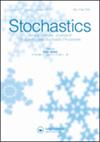Dynkin游戏的一般框架
IF 0.9
4区 数学
Q3 MATHEMATICS, APPLIED
Stochastics-An International Journal of Probability and Stochastic Processes
Pub Date : 2012-02-09
DOI:10.1080/17442508.2013.778860
引用次数: 37
摘要
我们在一般框架下重新审视Dynkin博弈问题,并放宽一些假设。收益和准则是用停止时间索引的随机变量族来表示的。构造了两个非负上鞅族J,它们的有限性等价于Mokobodski条件。在收益族的弱正则性假设下,证明了博弈是公平的,并证明了博弈是公共价值函数。在一些弱附加假设下,导出了鞍点的存在性。所有的结果都是用随机变量来表示的,并且只用经典的概率论结果来证明。本文章由计算机程序翻译,如有差异,请以英文原文为准。
Dynkin games in a general framework
We revisit the Dynkin game problem in a general framework and relax some assumptions. The pay-offs and the criterion are expressed in terms of families of random variables indexed by stopping times. We construct two non-negative supermartingale families J and whose finiteness is equivalent to the Mokobodski's condition. Under some weak right-regularity assumption on the pay-off families, the game is shown to be fair and is shown to be the common value function. Existence of saddle points is derived under some weak additional assumptions. All the results are written in terms of random variables and are proven by using only classical results of probability theory.
求助全文
通过发布文献求助,成功后即可免费获取论文全文。
去求助
来源期刊

Stochastics-An International Journal of Probability and Stochastic Processes
MATHEMATICS, APPLIED-STATISTICS & PROBABILITY
CiteScore
1.90
自引率
0.00%
发文量
42
审稿时长
>12 weeks
期刊介绍:
Stochastics: An International Journal of Probability and Stochastic Processes is a world-leading journal publishing research concerned with stochastic processes and their applications in the modelling, analysis and optimization of stochastic systems, i.e. processes characterized both by temporal or spatial evolution and by the presence of random effects.
Articles are published dealing with all aspects of stochastic systems analysis, characterization problems, stochastic modelling and identification, optimization, filtering and control and with related questions in the theory of stochastic processes. The journal also solicits papers dealing with significant applications of stochastic process theory to problems in engineering systems, the physical and life sciences, economics and other areas. Proposals for special issues in cutting-edge areas are welcome and should be directed to the Editor-in-Chief who will review accordingly.
In recent years there has been a growing interaction between current research in probability theory and problems in stochastic systems. The objective of Stochastics is to encourage this trend, promoting an awareness of the latest theoretical developments on the one hand and of mathematical problems arising in applications on the other.
 求助内容:
求助内容: 应助结果提醒方式:
应助结果提醒方式:


